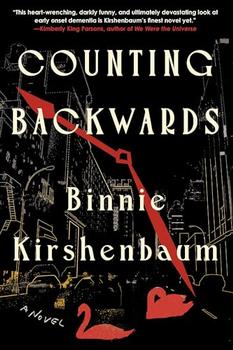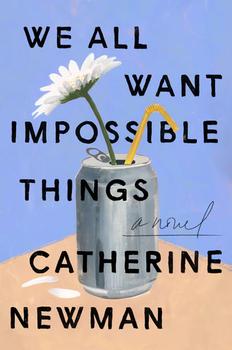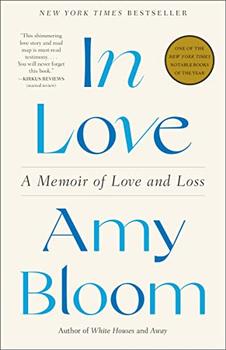Summary | Excerpt | Reviews | Beyond the book | Read-Alikes | Genres & Themes | Author Bio

A middle-aged couple struggles with the husband's descent into early-onset Lewy Body dementia in this profound and deeply moving novel shot through with Kirshenbaum's lacerating humor.
It begins with hallucinations. From their living room window, Leo sees a man on stilts, an acting troupe, a pair of swans paddling on the street. Initially, Leo believes the visions are related to visual impairment—they are something he and his wife, Addie, can joke about. Then, he starts to experience occasional, but fleeting, oddities that mimic myriad brain disorders: aphasia, the inability to perform simple tasks, Capgras Syndrome, audial hallucinations he believes to be real. The doctors have no answers. Leo, a scientist, and Addie, a collage artist, had a loving and happy marriage. But as his periods of lucidity become rarer, Addie finds herself less and less able to cope.
Eventually, Leo is diagnosed with Lewy Body disease. Life expectancy ranges from 3 to 20 years. A decidedly uncharacteristic act of violence makes it clear that he cannot come home. He moves first to an assisted living facility and then to a small apartment with a caretaker where, over time, he descends into full cognitive decline. Addie's agony, anger, and guilt result in self-imposed isolation, which mirrors Leo's diminished life. And so for years, all she can do is watch him die—too soon, and yet not soon enough.
Kirshenbaum captures the couple's final years, months, and days in short scenes that burn with despair, humor, and rage, tracking the brutal destruction of the disease, as well the moments of love and beauty that still exist for them amid the larger tides of loss.
The poet Rumi once wrote, "You are not a drop in the ocean, you are the ocean in a drop." But tell that to a caregiver whose lover has a deteriorating brain and doesn't recognize his life and has delusions. Even for an artist like Addie, who carefully selects the pieces to use in her collages, her humor, creativity, and wit cannot save Leo or their marriage. Counting Backwards doesn't pretend to know everything about dementia and the passages about the worst of the illness aren't heartbreaking nor are they emotionally raw. What it succeeds in showcasing is a committed marriage and the veneers that marriage shows the public...continued
Full Review
 (1151 words)
(1151 words)
(Reviewed by Valerie Morales).
 While planning her wedding at the age of twenty-four, after seven years of dating her fiancé, Erin Fortin was diagnosed with a rare blood disorder. Paroxysmal Nocturnal Hemoglobinuria, or PNH, involves the damage of red blood cells by the immune system. Because Erin and her future husband John both had a healthy sense of humor and loved to laugh, they tried to look at the bright side. "[O]nce we'd accepted my condition, we laughed about how we'd vowed 'in sickness and in health' before even getting to the altar."
While planning her wedding at the age of twenty-four, after seven years of dating her fiancé, Erin Fortin was diagnosed with a rare blood disorder. Paroxysmal Nocturnal Hemoglobinuria, or PNH, involves the damage of red blood cells by the immune system. Because Erin and her future husband John both had a healthy sense of humor and loved to laugh, they tried to look at the bright side. "[O]nce we'd accepted my condition, we laughed about how we'd vowed 'in sickness and in health' before even getting to the altar."
In a blog on the website PNH News, Erin talks about what has helped over the six years of her marriage and laid out three concepts she and John prioritized. The first thing her soon-to-be husband did, along with her ...

If you liked Counting Backwards, try these:

by Catherine Newman
Published 2023
For lovers of Meg Wolitzer, Maria Semple, and Jenny Offill comes this raucous, poignant celebration of life, love, and friendship at its imperfect and radiant best.

by Amy Bloom
Published 2023
Winner of the 2022 BookBrowse Nonfiction Award
This powerful memoir by New York Times bestselling author Amy Bloom is an illuminating story of two people whose love and shared life experiences led them to find a courageous way to part - and of a woman's struggle to go forward in the face of loss.
At times, our own light goes out, and is rekindled by a spark from another person.
Click Here to find out who said this, as well as discovering other famous literary quotes!